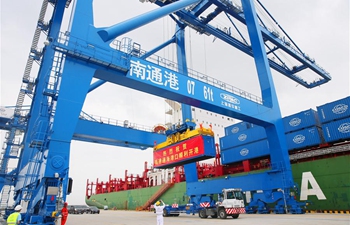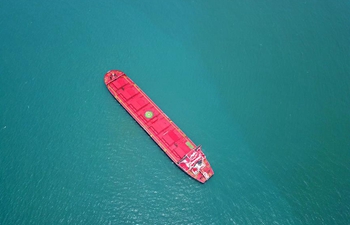by Burak Akinci
ANKARA, June 30 (Xinhua) -- The international trade suffers from new moves by the United States which is pushing countries to cut their oil imports from Iran to zero by November, escalating its bid to pressure Tehran after pulling out of the nuclear deal, said experts.
"The pressures from the U.S. are against the logic of global economy rules," said Altay Atli, an Istanbul-based academic and writer specializing in international political economy and international relations.
With new regulations and tariffs unilaterally imposed by the U.S. and the reaction given by other global players to this situation, "the global trade system is shaking to its core," commented the expert.
He called for the need of a new system which would be "free of American hegemony" and be the voice of greater majority on the international trade scene.
U.S. President Donald Trump announced in May that the U.S. was leaving the 2015 deal, in which sanctions on Iran, including its energy sector, had been eased in exchange for Tehran agreeing to roll back its nuclear program.
Oil prices rose to a three-and-a-half-year high on Thursday, bolstered by supply concerns over the U.S. move.
Some close allies of the United States are among the largest importers of Iranian crude oil, including India and South Korea. Japan and Turkey also import large amounts of Iranian oil, according to statistics from the U.S. Energy Information Agency.
India would bow to U.S. pressures, said reports that the country's oil ministry has asked refiners to prepare for a "drastic reduction or zero" imports of Iranian oil.
But Turkey will not honor Washington's demand. Turkish Economy Minister Nihat Zeybekci said Wednesday that the U.S. demand is non-binding for Turkey. "We will follow the United Nations on its decision. Other than this, we will only follow our own national interests."
Meanwhile, Iran's media quoted an official at the country's oil ministry as saying on Wednesday that removing Iran's crude oil from the market was an "impossible" thing to happen.
Experts believe that major international players, such as China and Russia, could refuse to comply with U.S. hardball campaign.
"In China's case, the Iranian crude oil is essential," argued Altay Atli, fearing that the U.S. move would even further deteriorate the trade conflict between Washington and Beijing.
Selcuk Colakoglu, director of the Ankara-based USAK Center for Asia-Pacific Studies, said to Xinhua that while China and Russia are resilient to the U.S. demands, small countries are more vulnerable to the pressure and threats from the Washington administration.
"Room for maneuver is more limited for European nations, such as France and Germany which have deep trade and economic ties with the United States. If these allies want to export their goods there, they would have to, in a way, concede to some demands coming from Washington," Colakoglu added.
Turkey, which shares an eastern border with Iran and relies heavily on oil imports, might expect to negotiate a good discount on Iranian crude in return for showing solidarity with its neighbor.
Turkey could also, according to some commentators, use its position to negotiate with Tehran as a bargaining chip in its row with Washington over U.S. denial of delivering F-35 fighter jets to Turkey, unless the Ankara government scraps its ongoing plans to acquire Russian S-400 advanced missile defence systems.
"Turkey is not dependent on U.S. trade ... its soft spot is the defence industry and foreign military purchases," underlined Colakoglu who implied that NATO ally Turkey could still be submitted to Washington's arm twisting diplomacy.

















